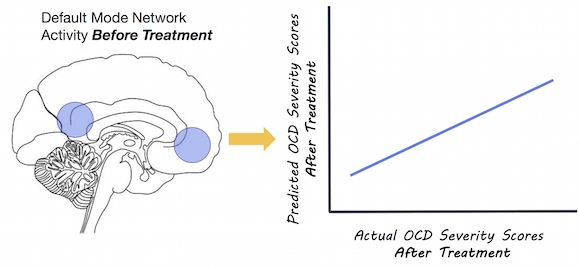Resting Brain Activity Predicts Who Responds to Cognitive Behavioral Therapy for OCD
What's the science?
Obsessive Compulsive Disorder (OCD) affects 1-2% of the population and can affect quality of life. Cognitive behavioral therapy (CBT) is a method of treatment that has been shown to be effective in some individuals, but not all. Currently, there is no method to predict who will benefit from CBT. Recently, functional MRI of individuals at rest has emerged as a promising tool for predicting treatment outcomes. This week in PNAS, Reggente and colleagues test whether resting brain activity patterns can predict treatment response.
How did they do it?
Adults with a diagnosis of OCD underwent resting state functional MRI scans before and after 4 weeks of daily CBT. They analyzed the resting state fMRI scans using a multivariate approach and machine learning to detect whether patterns of resting state activity before treatment could predict individual OCD symptom severity scores after treatment. Resting brain activity was extracted from 196 brain regions and patterns of activity in all regions were correlated with one another. Multivariate analyses have the ability to capture multiple patterns of brain activity, and may be better than univariate approaches for predicting individualized responses to treatment. OCD symptom severity was also assessed before and after the 4 weeks of treatment.
What did they find?
OCD symptom severity scores improved after treatment in almost all participants. The authors found that pre-treatment resting state patterns in two brain networks -the default mode network and the visual network - strongly predicted individual variability in OCD symptom severity score. The default mode network (active while an individual is at rest) accounted for 67% of the variation in post-treatment symptom severity scores, while the visual network accounted for 51%. The activity in these networks better predicted post-treatment severity scores than the severity of OCD before treatment.
Brain by cronodon.com, Image by BrainPost
What's the impact?
Knowing who will respond to treatment is important as CBT is time consuming and expensive. This is the first study to report resting state network patterns as a reliable predictor of individual response to CBT treatment for obsessive compulsive disorder. Individual resting state patterns could reflect the plasticity or adaptability of brain networks to treatment. This study brings us one step closer to using individualized treatment plans for complex disorders.
Reach out to study author Dr. Nicco Reggente on Twitter @mobiuscydonia
N. Reggente et al., Multivariate resting-state functional connectivity predicts response to cognitive behavioral therapy in obsessive–compulsive disorder. PNAS. (2018). Access the original scientific publication here.


